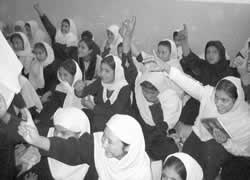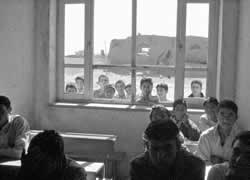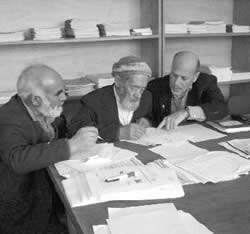A Campaign for Equity: Worldwide
Winning Hearts Through Minds
In
A visitor to the
Yet it's the promise of what's taking place in such bleak settings that has many people excited. For Afghan parents, it's "the belief that sending their children to school will help normalize their children's lives and help them to move out of poverty," says Barry Rosen, head of Teachers College's Afghanistan Project. A team led by Rosen went to
It's a mission that has unique resonance for both Teachers College and Rosen himself. In 1954, the College also sent a team to
Rosen, a slim, intense man who most recently headed TC's Office of External Affairs, brings a special passion to the task. From 1979 to 1980, he was one of the 52 Americans held hostage by Iranian students for more than a year. Since then, he has remained deeply interested in Islam and Islamic cultures, even appearing on panel discussions with some of his former captors to discuss strategies for bridging divisions with the West.
The current TC Afghanistan Project-which includes a contingent of Canadian Afghanis, as well as retired TC professor Margaret Jo Sheperd-has worked toward the latter aim chiefly through its focus on creating new textbooks and curricula, and training teachers to use them. There is a "Life Skills" book that teaches first-, second- and third-graders about conflict resolution, and then becomes the basis for a fourth-grade course in Social Studies. And Rosen himself headed up the team when it tackled updating the religion book for first- and second-graders. The first part of the book contains suras, or chapters of the Koran, for the children to read aloud, in part so they can learn to pronounce words as their ancestors have for centuries. But it was the second half of the book, which discusses the history of Islam, that presented the greater opportunity-and challenge. The team created written narratives in which boys and girls speak about Islam as a religion of peace and respect. Sometimes this led to intense debates about whether cultural norms were being violated. For example, Rosen felt that young children didn't need to know every step in preparing for prayer, such as how to clean one's beard. He was overruled. The team ultimately decided this information was too important to remove, and simply moved it to a later section.
The team also faced the challenge of navigating a foreign culture in a war-torn and still volatile part of the world. Each day was an adventure. Rosen, who hadn't been in the country since his Peace Corps days in the 1960s, says years of conflict have kept it frozen in time. Buildings have no heat in the winter, and electricity is spotty at best. The altitude and thick, dusty air made breathing difficult for some. Security was tight, and the days and nights were often punctuated by the sounds of rockets exploding. Afghan team members were frequently ordered by the United Nations authorities to stay at home during these emergencies.
Still, there were also lovely and heartening moments. One Friday, the team went for a picnic and met some Afghan families and their drivers. "It was a pleasant moment that gave me a small indication that people were feeling better and more secure," Rosen recalls.
And then there was the day they all went for a walk on one of
"It was one of those rare moments where you feel you're making a difference, and you can actually see it happening," Rosen says.
After months of discussing and writing the textbooks, it was time for the team to test them out in the field. First, they worked with the Ministry of Education to bring in teachers from 54 schools all over the country. They talked to the teachers about the books and acted out scenes to show how the activities should be done. Following the training, the teachers returned to their provinces, and soon afterwards, the team visited them in their schools.
"We watched the students and noted their reactions," Rosen says. "We were overjoyed that the textbooks were working, and that we were getting the opportunity to learn how to improve them."
Of course, there is still a tremendous challenge ahead. Security has improved in
Except that now, the new textbooks are bringing a potent new light into
Published Friday, May. 27, 2005



